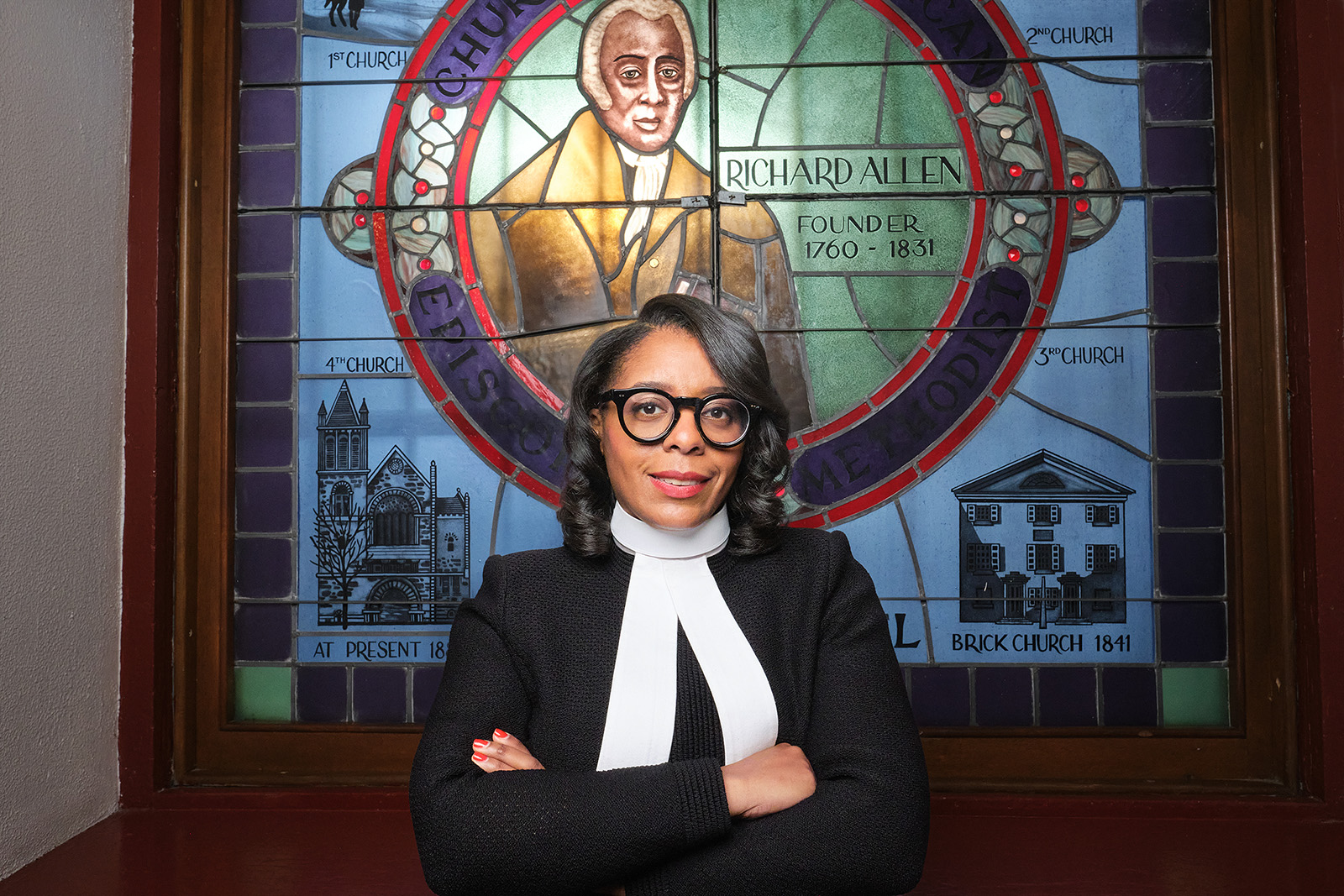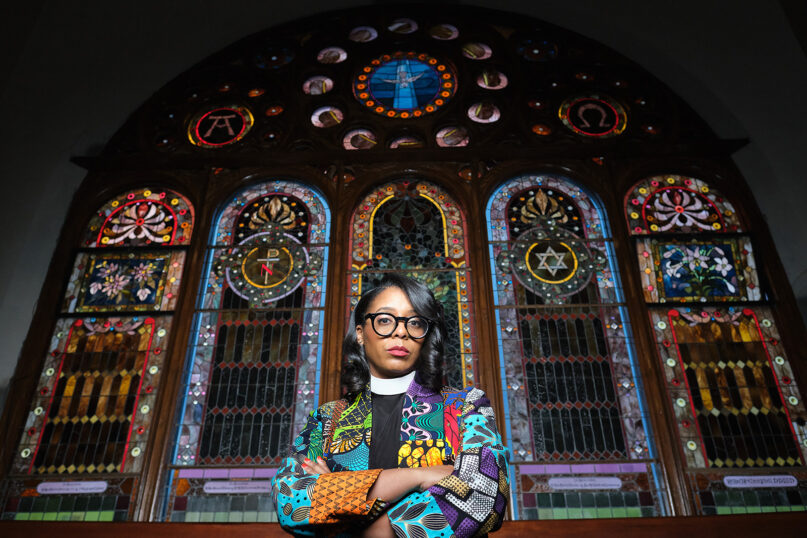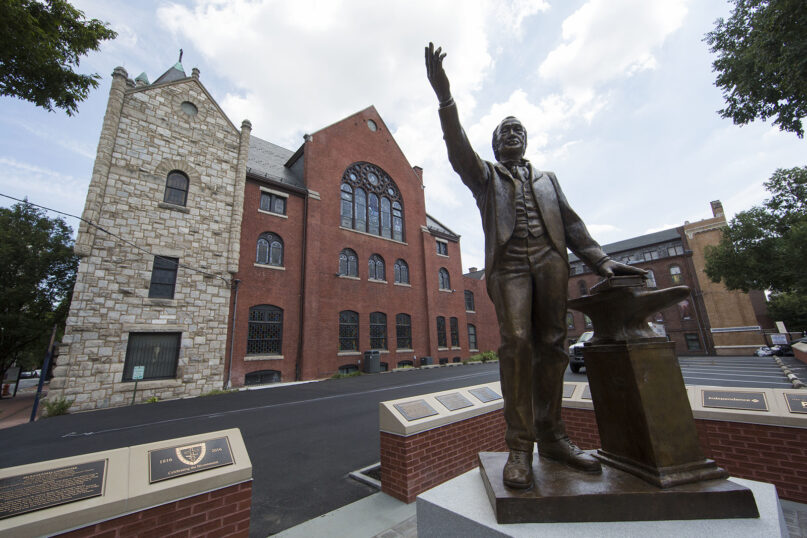First woman pastor of historic Mother Bethel AME calls her appointment ‘mind-boggling’
(RNS) — ‘Who would have ever thought?’ said Cavaness on her 17th day as the 53rd pastor of the church. ‘It’s such a victory on so many different levels.’

The Rev. Carolyn Cavaness is the first woman to lead Mother Bethel AME Church in Philadelphia. (Photo © Jameel Morrison/jameelphoto.com)
Adelle M. Banks
December 5, 2024
(RNS) — In early November, the Rev. Carolyn Cavaness was already bracing for a big task — preaching the closing sermon at the fall convocation of the First Episcopal District of the African Methodist Episcopal Church in Philadelphia.
But as she was about to go the pulpit, she was surprised to hear she had received a much grander assignment: The district’s bishop introduced her as the new pastor of the nearby Mother Bethel AME Church, the historically Black denomination’s founding congregation.
Mother Bethel was founded by Richard Allen in 1791 after Allen, a Black lay preacher at Philadelphia’s St. George’s Methodist Episcopal Church, saw a white official at the church pull his fellow Black preacher, Absalom Jones, to his feet as Jones knelt in prayer.
Cavaness is the first woman to lead Mother Bethel.
A fourth-generation preacher, Cavaness, 41, long knew she was going to enter the ministry. “I had a preacher’s license before I had a driver’s license,” she said in an interview.
RELATED: COVID-19 health emergency is ending but faith-based vaccine clinics continue
The Newark, New Jersey, native moved just 10 miles to her new church from her old one, Bethel AME Church of Ardmore, Pennsylvania, where she had helped 2,000 people get COVID-19 vaccinations during the pandemic and partnered with other organizations in the Philadelphia suburb to distribute 800 prepared meals for an annual community “Friendsgiving” outreach.
She thinks of the pastor’s role, Cavaness said, as a “designated maidservant,” a phrase she uses as she prays before preaching. “I’m here to serve,” she said. “I’m here at this table that God set aside for me to impart and to bring his Word to his people.”

The Rev. Carolyn Cavaness, center, leads a worship service at Mother Bethel AME Church in Philadelphia. (Photo by Michael Morgan)
She has deepened her experience with work outside the denomination, having served as a fundraiser for her alma mater, Barnard College, and as deputy finance director for Hillary Clinton’s presidential campaign.
Still, Cavaness calls her appointment “mind-boggling.”
“Who would have ever thought?’’ she said on her 17th day as the 53rd pastor of the church. “It’s such a victory on so many different levels.”
Cavaness spoke with RNS about adjusting to her role, about remembering those who came before her ,and about tasks Black clergy like her may have ahead with a second Trump administration.
The interview was edited for length and clarity.
What has it felt like for the last couple of weeks to be the new pastor of Mother Bethel AME, especially given that you are the first woman pastor at this historic church?
I am still processing. I’m still in shock. I am greatly humbled. I am just feeling a sense of, like, wow. I know I did not arrive at this space on my own. So many have mentored me and pushed me and have trusted me. And so I just feel a debt of gratitude to be at such a historic treasure, not only for the African Methodist Episcopal Church, but for America, for the world.

The Rev. Carolyn Cavaness is the first woman to lead Mother Bethel AME Church in Philadelphia. (Photo © Jameel Morrison/jameelphoto.com)
In your first sermon as pastor there, you said you “stand on the shoulders” of other women who came before you, including church member and early preacher Jarena Lee. How has her story informed your ministry?
She was unapologetic about her call. To see the full circle: She’s born Feb. 11, 1783. I’m April 4, 1983, and so 200 years later, plus-minus two months. We as a denomination in 2016, upon the bicentennial of the incorporation of the AME Church, granted her ordination posthumously. To see this coming full circle and what this represents, not only for the African Methodist Episcopal Church, but for other denominations, for other spheres that women can lead, women will lead, and women deserve opportunity, for doors to be opened, and can do it.
Your appointment to Mother Bethel was announced just as your audience was learning there would be a second Donald Trump administration. What was your message to the clergy and laypeople there?
It was “Tomorrow begins today,” recalling that the house of Israel, with Joshua, a young leader, had to lead them into the Promised Land. And here is this river that they’ve got to cross. And so how is it that we, as the Black church, how is it laity and clergy will be able to make it over this river?
A large crux of the sermon, too, was, Our people are going to need us. Our communities need us. People are hurting. Even though we’re in our own pain, even though we’re looking for healing, people still need a meal, people are still looking for, How do I help my children? Yes, this hurts. This is painful, what’s possibly coming in our direction, but as people who have been empowered by Jesus Christ, we need to prepare, to strategize, to mobilize, to collaborate, and keep it before us that trouble doesn’t last always. We take care of our own. If the government comes along, it’s nice, but at the end of the day, it’s incumbent on us to take care of our people.
What are you or other Black clergy planning in light of the election results?
One is, how do we shore up our congregations and be clear about the fallout for people of color? We can look at food and access to certain types of benefits. We may see an increase in the need for a food pantry or prepared food, the health and equity pieces, education. And the Black church, when we have had these fallouts, has always shown up and has risen to the occasion for the good, just not for our people, but for community. And so that’s one of my strong concerns: Are our churches able to handle the demand?

A statue of Bishop Richard Allen outside the historic Mother Bethel African Methodist Episcopal Church in Philadelphia. (AP Photo/Matt Rourke)
Is there one thing you know you want to accomplish or change at Mother Bethel, and perhaps, one thing you know you don’t want to change about it?
Well, one thing I can’t change is its history, and that we’re unapologetic about it. We are the oldest land continuously owned by African Americans in America. That’s breathtaking.
The other piece is that, with that strong history, how does that propel us for the history that needs to be made? What is the contribution we are leaving for others who will come after us? How do we preserve this national, international treasure? How do we continue to tell the story, as we prepare for (the 250th anniversary of America’s independence) in 2026? We’re part of that story.
You’re expecting to have a role in that historic day?
Yes, yes. Have to. There’s no way, no way around it.

The Rev. Carolyn Cavaness is the first woman to lead Mother Bethel AME Church in Philadelphia. (Photo © Jameel Morrison/jameelphoto.com)
Adelle M. Banks
December 5, 2024
(RNS) — In early November, the Rev. Carolyn Cavaness was already bracing for a big task — preaching the closing sermon at the fall convocation of the First Episcopal District of the African Methodist Episcopal Church in Philadelphia.
But as she was about to go the pulpit, she was surprised to hear she had received a much grander assignment: The district’s bishop introduced her as the new pastor of the nearby Mother Bethel AME Church, the historically Black denomination’s founding congregation.
Mother Bethel was founded by Richard Allen in 1791 after Allen, a Black lay preacher at Philadelphia’s St. George’s Methodist Episcopal Church, saw a white official at the church pull his fellow Black preacher, Absalom Jones, to his feet as Jones knelt in prayer.
Cavaness is the first woman to lead Mother Bethel.
A fourth-generation preacher, Cavaness, 41, long knew she was going to enter the ministry. “I had a preacher’s license before I had a driver’s license,” she said in an interview.
RELATED: COVID-19 health emergency is ending but faith-based vaccine clinics continue
The Newark, New Jersey, native moved just 10 miles to her new church from her old one, Bethel AME Church of Ardmore, Pennsylvania, where she had helped 2,000 people get COVID-19 vaccinations during the pandemic and partnered with other organizations in the Philadelphia suburb to distribute 800 prepared meals for an annual community “Friendsgiving” outreach.
She thinks of the pastor’s role, Cavaness said, as a “designated maidservant,” a phrase she uses as she prays before preaching. “I’m here to serve,” she said. “I’m here at this table that God set aside for me to impart and to bring his Word to his people.”

The Rev. Carolyn Cavaness, center, leads a worship service at Mother Bethel AME Church in Philadelphia. (Photo by Michael Morgan)
She has deepened her experience with work outside the denomination, having served as a fundraiser for her alma mater, Barnard College, and as deputy finance director for Hillary Clinton’s presidential campaign.
Still, Cavaness calls her appointment “mind-boggling.”
“Who would have ever thought?’’ she said on her 17th day as the 53rd pastor of the church. “It’s such a victory on so many different levels.”
Cavaness spoke with RNS about adjusting to her role, about remembering those who came before her ,and about tasks Black clergy like her may have ahead with a second Trump administration.
The interview was edited for length and clarity.
What has it felt like for the last couple of weeks to be the new pastor of Mother Bethel AME, especially given that you are the first woman pastor at this historic church?
I am still processing. I’m still in shock. I am greatly humbled. I am just feeling a sense of, like, wow. I know I did not arrive at this space on my own. So many have mentored me and pushed me and have trusted me. And so I just feel a debt of gratitude to be at such a historic treasure, not only for the African Methodist Episcopal Church, but for America, for the world.

The Rev. Carolyn Cavaness is the first woman to lead Mother Bethel AME Church in Philadelphia. (Photo © Jameel Morrison/jameelphoto.com)
In your first sermon as pastor there, you said you “stand on the shoulders” of other women who came before you, including church member and early preacher Jarena Lee. How has her story informed your ministry?
She was unapologetic about her call. To see the full circle: She’s born Feb. 11, 1783. I’m April 4, 1983, and so 200 years later, plus-minus two months. We as a denomination in 2016, upon the bicentennial of the incorporation of the AME Church, granted her ordination posthumously. To see this coming full circle and what this represents, not only for the African Methodist Episcopal Church, but for other denominations, for other spheres that women can lead, women will lead, and women deserve opportunity, for doors to be opened, and can do it.
Your appointment to Mother Bethel was announced just as your audience was learning there would be a second Donald Trump administration. What was your message to the clergy and laypeople there?
It was “Tomorrow begins today,” recalling that the house of Israel, with Joshua, a young leader, had to lead them into the Promised Land. And here is this river that they’ve got to cross. And so how is it that we, as the Black church, how is it laity and clergy will be able to make it over this river?
A large crux of the sermon, too, was, Our people are going to need us. Our communities need us. People are hurting. Even though we’re in our own pain, even though we’re looking for healing, people still need a meal, people are still looking for, How do I help my children? Yes, this hurts. This is painful, what’s possibly coming in our direction, but as people who have been empowered by Jesus Christ, we need to prepare, to strategize, to mobilize, to collaborate, and keep it before us that trouble doesn’t last always. We take care of our own. If the government comes along, it’s nice, but at the end of the day, it’s incumbent on us to take care of our people.
What are you or other Black clergy planning in light of the election results?
One is, how do we shore up our congregations and be clear about the fallout for people of color? We can look at food and access to certain types of benefits. We may see an increase in the need for a food pantry or prepared food, the health and equity pieces, education. And the Black church, when we have had these fallouts, has always shown up and has risen to the occasion for the good, just not for our people, but for community. And so that’s one of my strong concerns: Are our churches able to handle the demand?

A statue of Bishop Richard Allen outside the historic Mother Bethel African Methodist Episcopal Church in Philadelphia. (AP Photo/Matt Rourke)
Is there one thing you know you want to accomplish or change at Mother Bethel, and perhaps, one thing you know you don’t want to change about it?
Well, one thing I can’t change is its history, and that we’re unapologetic about it. We are the oldest land continuously owned by African Americans in America. That’s breathtaking.
The other piece is that, with that strong history, how does that propel us for the history that needs to be made? What is the contribution we are leaving for others who will come after us? How do we preserve this national, international treasure? How do we continue to tell the story, as we prepare for (the 250th anniversary of America’s independence) in 2026? We’re part of that story.
You’re expecting to have a role in that historic day?
Yes, yes. Have to. There’s no way, no way around it.
No comments:
Post a Comment